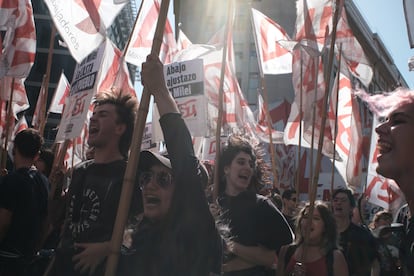With his back to the institutions, Milei presses ahead with dismantling the Argentine state
The authoritarian drift of the president and the radical nature of the announced measures are taking their toll on the far-right: the social climate is effervescent and he has fallen in the polls

Javier Milei walked down the steps of Congress to give his inauguration speech as president of Argentina less than a month ago. With his back to parliament, he spoke facing the followers who were waiting for him under the scorching sun. It was a gesture, and then came the measures. In the first 20 days of government, the far-right politician imposed a decree that changes or repeals more than 300 laws without debate, implemented a protocol of action against protests, and sent a bill to Congress to expand the powers of the Executive. This authoritarian drift and the radical nature of the measures are beginning to take their toll on the president. The social climate is effervescent — the unions announced a strike for the end of January — and Milei’s negative image has risen five points to 55% since he arrived at the Casa Rosada, according to a consultant.
Milei’s party, La Libertad Avanza, does not have majorities in Congress — it has only 38 of 257 deputies and seven of 72 senators — and lacks its own governors with the ability to influence parliament. However, he retains the broad support that the polls gave him. Milei received 30% of the votes in the first electoral round and managed to add 56% in the second against the Peronist Sergio Massa. These days, the far-right is in the honeymoon period that follows electoral victory. From his own experience, Milei’s now ally — former conservative president Mauricio Macri — recommended moving forward “with shock and without gradualism.”
On top of the megadecree with more than 300 reforms to begin dismantling the state and the bill with more than 600 articles that gives a radical turn to the Argentine political, economic, and social system, and in addition to a protocol that bans street closures, Milei has added a decalogue of economic measures that apply a radical readjustment: dismissing more than 5,000 state employees hired in the last year and suspending a similar number from welfare payments due to “incompatibilities,” as reported by the government Friday. Every day, the Milei government overwhelms Argentines with new announcements. On the last working day of this year, presidential advisor Federico Sturzenegger, author of the first package sent to Congress, announced that they will announce another initiative that includes the elimination of 160 regulations. Milei puts it in these terms: “Argentina requires an urgent change of course to avoid disaster.”
“Milei is trying to dismantle the country that has been put together since 1916. At the beginning of the 21st century in Argentina there was also a regime change that oriented the state and society towards the center-left. The one that is being produced now is very strong and very fast,” says Sergio Morresi, doctor in political science and co-author of the book Está entre nosotros: ¿De dónde sale y hasta dónde puede llegar la extrema derecha que no vimos venir? (It is among us. Where does the extreme right that we did not see coming come from and how far can it go?). To achieve this, the political scientist says, the president relies on a “contempt for institutions” that “has been developing for a long time” in Argentina. “Argentina is a place where democracy is still valued. But what does Milei understand by democracy? Do what people want as he interprets it; That is, to do what his voters, not the collective, enable him to do,” explains Morresi.

Asked during the campaign if he believes in the democratic system, Milei did not answer the journalist’s question, which asked for a clear definition. “I believe that democracy has many errors,” he said simply. Some have resorted to adjectives such as “Napoleonic” — as pointed out by a center-right politician, Rodrigo De Loredo — or “messianic” — as the former left-wing Uruguayan president José Mujica pointed out — to describe the president in accordance with the first acts of his government. He has also been described as “revolutionary” by the historian and analyst Carlos Pagni. The columnist for EL PAÍS wrote in the newspaper La Nación: “Revolutions negotiate little, they are not deliberative. It is an idea of how society should be drawn that is transferred to reality as if it were a blank piece of paper.”
The institutional weakness of the Milei government to carry out the “reconstruction” of a country in crisis is compensated by the support it receives from at least two actors, Morresi believes. “Milei has just won clearly and has some social support. Furthermore, in these few weeks he has received strong and determined support from the most important business groups in the country,” says the analyst. The political scientist adds that the far-right also has the support of Together for Change, the center-right coalition he faced in the elections, and part of Peronism, which will be crucial for the megadecree and for the “omnibus law” to pass through Congress.
The legislative chambers are one of the obstacles that the far-right measures will have to overcome — another is the judiciary and the third is social mobilization. Milei has maintained his challenge to the legislative branch since he walked down the steps of Congress on December 10 and turned his back on them. “Explain to me why Congress is against something that is good for people. Because people understood well, right?” he said in a television interview. If Congress does not approve his measures, he suggested that night, he will call a referendum — which will have to be non-binding. Later, he accused “some” legislators of being corrupt: “Those who like to argue so much do so because they are looking for bribes.”
“This way of governing that he is proposing has to do with his way of understanding power and reading the keys to the position he is in,” political scientist Yanina Welp believes. The academic, who is a specialist in the study of democracy, disagrees with those who argue that Milei is governing alone because the lack of majorities in Congress leaves him with no other option: “There are always alternatives in democracy,” she points out. Expanding the government coalition or negotiating each law separately, for example, are some of the options proposed on social media. It is a “risky alternative” that can “delegitimize a necessary public policy agenda.” Furthermore, others warn that the polarization caused by such radical measures can further damage the already fragmented Argentine society.
The more than 300 reforms in the megadecree came into force Friday but have yet to be approved by parliament. The 664 articles of the omnibus law will be discussed in extraordinary sessions of Congress. For Welp, two scenarios open up. “If the law passes, we would be facing a situation very similar to that of Fujimori’s Peru,” the political scientist explains. For different analysts, Milei is trying to raise a conflict of legitimacy with parliament, as the former Peruvian president did in the early 1990s. Alberto Fuijimori came to the presidency with enormous popular support and took advantage of it to attack Congress, where he did not have majorities. The Peruvian deputies, scared and delegitimized, gave him special powers. The Shining Path’s heavy hand against terrorism made Fujimori even more popular and after months of attacking Congress, he closed it in 1992 with a self-coup.

“I have doubts that it will happen. If it does not happen, the uncertainty is greater,” warns Welp. “In the second scenario we would be faced with a situation where Milei would be forced to back down and govern in a different way.” The analyst warns that “a majority takes a dim view of the content and procedure of the reforms.” In recent days, the courts have received proposals of unconstitutionality against the megadecree that constitutional lawyers see as justified, and hundreds of thousands of people have taken to the streets to reject the unilateral way in which the measures are being proposed. Protesters also reject the content of these measures, which enable the privatization of public companies, open the door to operations in dollars, punish protests, and fire the starting gun on making the labor market and the health system more flexible.
A study by the consulting firm Zuban Córdoba y Asociados published Friday reveals that since Milei assumed the presidency, his negative image has worsened by five points and has gone from 50% to 55%. The analysis shows that for more than half of the population surveyed, the country has taken the “wrong” direction since the president took office. “Both the deregulatory DNU and the omnibus law presented in Congress have garnered significant levels of dissatisfaction. There even seems to be a majority forming that is willing to vote against all measures in a potential plebiscite,” the study points out. 56% of those consulted say that the megadecree “is unconstitutional” and more than half affirm that they “strongly disagree” with sending the bill to Congress.
For 44%, Milei still has a positive image, according to the study. Carla Yumatle, a political philosopher and professor at the Torcuato Di Tella University, explains that the social support that Milei still has allows him to “comprehend the social mood” of “disaffection, anger, frustration” on the part of citizens. “He has the support having promised pain and sacrifice. Argentines see the status quo as more costly than all the suffering that Milei is asking of them,” Yumatle explains. “The idea that the state hinders and does not guarantee freedom, but rather takes it away, is an unprecedented fact in Argentine political culture,” the theorist adds.
“Milei has positioned himself against the status quo. He sees the existing order as a trap and does not believe that it is possible to get out of that trap with the mechanisms proposed by that same social order. How do you go about producing decisive social change? I think it’s creating a certain anarchy, so that no one really knows where they stand. It is a way of implementing a refoundation, a tabula rasa”, says Yumatle. The philosopher warns, however, that “refounding is not the same as governing:” “What is effective at the beginning is not necessarily effective in keeping you going later, and the fact that it starts like this does not necessarily mean that it will continue.” For the analyst, what remains to be seen is if Milei is going to recognize that difference: “If he is going to see it or if Congress and the public are going to force him to recognize it.”
Sign up for our weekly newsletter to get more English-language news coverage from EL PAÍS USA Edition
Tu suscripción se está usando en otro dispositivo
¿Quieres añadir otro usuario a tu suscripción?
Si continúas leyendo en este dispositivo, no se podrá leer en el otro.
FlechaTu suscripción se está usando en otro dispositivo y solo puedes acceder a EL PAÍS desde un dispositivo a la vez.
Si quieres compartir tu cuenta, cambia tu suscripción a la modalidad Premium, así podrás añadir otro usuario. Cada uno accederá con su propia cuenta de email, lo que os permitirá personalizar vuestra experiencia en EL PAÍS.
¿Tienes una suscripción de empresa? Accede aquí para contratar más cuentas.
En el caso de no saber quién está usando tu cuenta, te recomendamos cambiar tu contraseña aquí.
Si decides continuar compartiendo tu cuenta, este mensaje se mostrará en tu dispositivo y en el de la otra persona que está usando tu cuenta de forma indefinida, afectando a tu experiencia de lectura. Puedes consultar aquí los términos y condiciones de la suscripción digital.








































